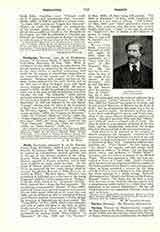

Verdaguer, JACINTO, poet, b. at Riudeperas, Province of Barcelona, Spain, April 17, 1845; d. at Vallvidrera, Barcelona, June 10, 1902. While in training to receive Holy orders, he early showed his literary instincts by competing for the prizes offered in the Jochs Florals, or poetical tournament, held yearly for the purpose of stimulating composition in the vernacular of the eastern part of the Iberian peninsula. Religious faith, country, and love are the main themes promoted by the Jochs Florals, and on the first two of these Verdaguer wrote with signal success, winning his first prize in 1861. He was ordained in 1870. In 1877 he published his most famous work, one of the most notable in the history of modern Catalan, the epic “La Atlantida,” which quickly attracted attention and was translated into Spanish, French, Italian, English, and German. The “Oda a Barcelona” of 1883 was followed by the epic legend, “Canigo” (dealing with the times of the reconquest of Spain from the Moors and locating its scenes in the Pyrenees region). Then came the noted “Idilis y cants mistichs” (1879), the “Cansons de Montserat” (1880), the “Caritat” (1885), the”Patria” (1888), the “Cants religiosos pel poble” (1882), the “Somni de Sant Joan” (1887), the “Jesus Infant” (1890-05), the “Sant Francesch” (1895), the “Flors del Calvari” (1896), the “Santa Eularia” (1898), etc.
J. D. M. FORD

